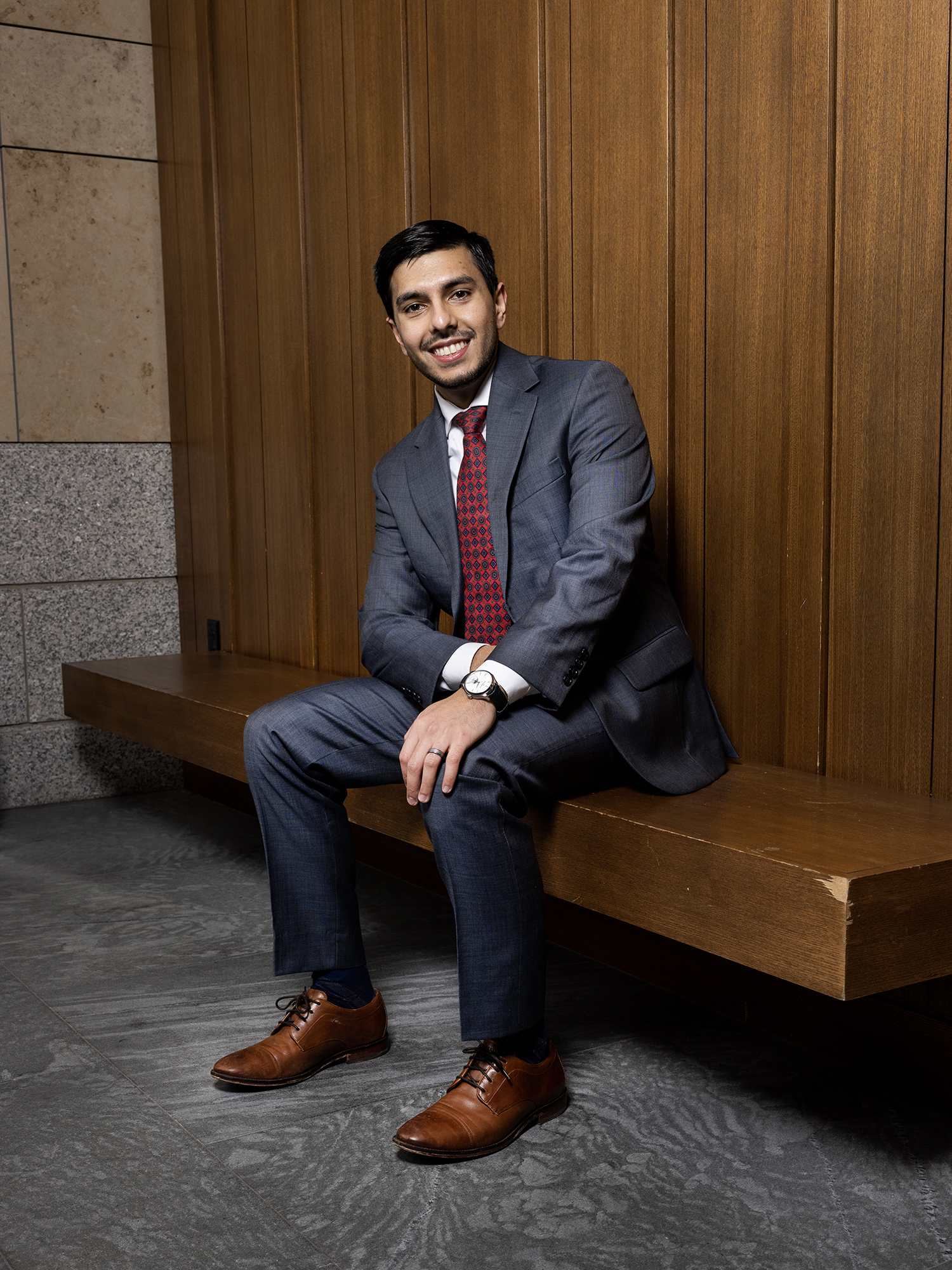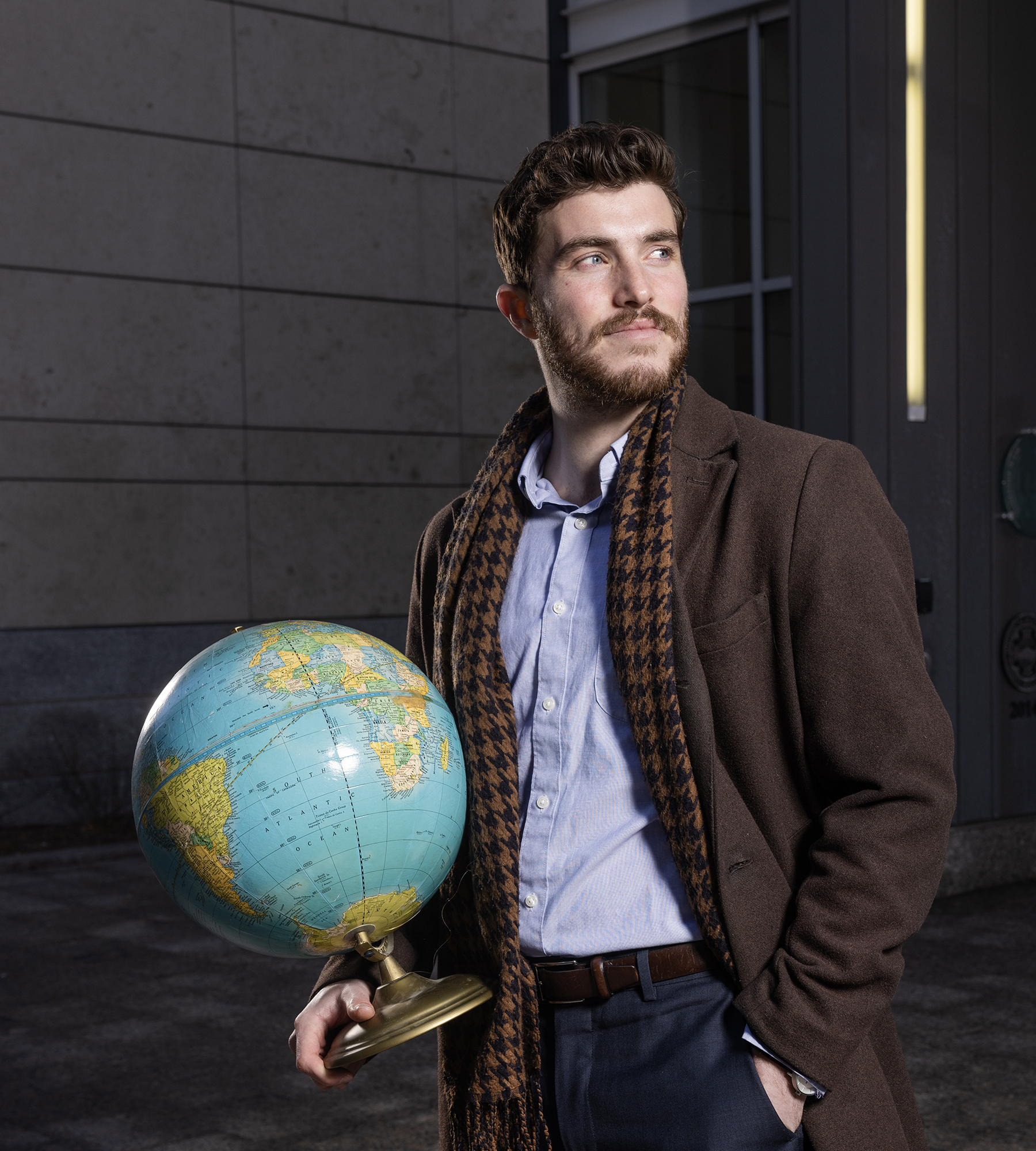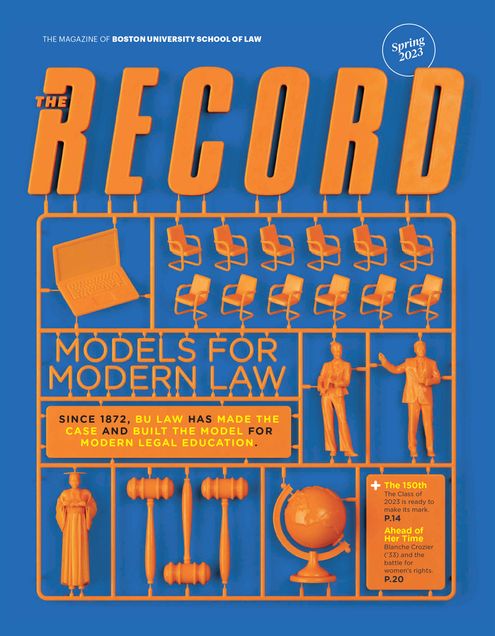The 150th
The Class of 2023 is ready to make its mark.

The Commencement of the Class of 2023—BU Law’s 150th graduating class—makes a fitting culmination to a year of events celebrating the school’s sesquicentennial. Like tens of thousands who have gone before them, these graduates are poised to go out in the world and accomplish amazing things.
Studying and socializing together across various cultural backgrounds and experiences, they formed close bonds and learned about themselves and the law.
This group of JD students arrived from 21 countries and 35 states, plus the District of Columbia and Puerto Rico. They had the added challenge of beginning their studies during a pandemic. But they went the distance. They worked hard to apply themselves and find career paths that matched their interests and abilities.
Likewise, the LLM, masters, and certificate students hailed from 40 countries and represented professionals at every career level, from age 21 to 70. Many received intensive instruction in legal English to build a strong foundation for their studies. They will use their newfound knowledge to advance their careers and improve legal systems here and abroad.
We checked in with three JD students and two LLM students during their final year to learn more about what made their time at BU Law unique and how they plan to make the most of their degrees.
Zhuoming Yuan Found Her Voice in a New Country

The Record: What brought you to BU Law from your home in Zhejiang Province in China?
Zhuoming Yuan: My first visit to the USA was in 2011, when I was in middle school. I visited Boston University and loved the environment here. I majored in intellectual property in undergraduate school, and BU Law’s IP major ranked very high, so that’s the biggest reason I chose here. Also, the two-year LLM program suited me. One year is too short to experience a foreign country and get your legal degree in a foreign language. Boston is a great city for both studying and living.
The Record: What stands out about your time at BU Law?
Zhuoming Yuan: I want to introduce this in two parts. The first is about the Legal English Certificate Program (LECP). I would describe the LECP as a small but warm family—giving me many supports and influencing me a lot. The second is academics. At BU Law was the first time I experienced the Socratic teaching method. This method is very different from my experience in China. The Socratic method forces me to think individually. I know that not every question or case has a correct answer or solution. What’s important is the process I take to develop my ideas and answers, even if the result is wrong or different from the professor’s.
The Record: How has the experience changed you as a person?
Zhuoming Yuan: I was quite introverted and quiet back in China. But the encouragement from my professors and classmates made me much braver. I learned that it’s okay to make mistakes. What I should care about is whether I take steps to challenge myself and express myself. Thanks to their help, I can now actively participate in class. I also obtained excellent study skills. I formed habits: always be prepared and make a plan or to-do list.
The Record: What’s next after graduation?
Zhuoming Yuan: I’m applying for JD programs in the USA. The US legal system is quite different from the Chinese. It’s the difference that appeals to me. I always want to learn something new. I want to experience more in America, too. My parents have always supported me in having a foreign education. Since I was very little, I have traveled abroad. Before I came to BU, I thought I would be an IP lawyer in a law firm and maybe work hard for years and try to become a partner one day. But based on my experience here, I learned this is not the only choice. I want to try more things and then make the final decision.
The Record: What drew you to intellectual property law?
Zhuoming Yuan: Well, I’m a book lover. I love reading novels and comic books. These and other artworks benefit from intellectual property protection like copyright and trademarks. Detective novels are why I got interested in the law in the first place. One of my favorite books is Murder on the Orient Express by Agatha Christie. The detective in that book combined rationality and sensitivity. I started to think the law is great, and I want to learn more about that.
Julie Antonellis Found Stability in Unprecedented Times

The Record: What are some of the highlights of your time at BU Law?
Julie Antonellis: The first year was a bit challenging because I was mostly remote, so it was harder to make connections. But since then, I’ve met a lot of great people and been able to make friends through classes and organizations like the BU Law Review and the Women’s Law Association. I’ve had the chance to intern for places like the US Attorney’s Office and the US Equal Employment Opportunity Commission and serve as a summer associate at Choate, Hall & Stewart. My Wrongful Convictions Practicum was also interesting. I don’t know how much of it we can discuss because it’s ongoing, but we investigated the innocence of a man convicted of murder in Massachusetts.
The Record: What are your plans after law school?
Julie Antonellis: I will be a litigation associate at Choate after I graduate and pass the bar. You’re more of a generalist during your first few years of practice. So, I’ll try their different departments: government enforcement, insurance, intellectual property litigation, and complex trial and appellate litigation. I’ll decide which ones I enjoy the most before I specialize.
The Record: How did you come to choose litigation?
Julie Antonellis: I tried both litigation and transactional work, but I realized I’m much more interested in the topics that litigation covers. There are a lot of opportunities for writing and analyzing laws. I like that aspect. Formulating arguments or drafting motions—those things are right up my alley. I enjoy doing that, and I like that I get to use my critical thinking skills. It seemed like everyone except me knew I would go into litigation, but I figured it out!
The Record: Did you have a favorite class?
Julie Antonellis: The two classes that stand out most for me are reproductive rights and sex crimes. In the sex crimes course, I wrote a final paper on sex work comparing different jurisdictions’ approaches to regulating sex work. The reproductive rights class was also fascinating, especially post-Dobbs [the Supreme Court decision that overturned federal abortion rights]. It feels like a more challenging time to be a law student, with the Supreme Court throwing out precedents. It seems like there’s a lot of instability and unpredictability with the direction of the law. So, it’s an interesting time to be a law student, but it’s also frustrating because you lack predictability.
The Record: What activities do you enjoy in your downtime?
Julie Antonellis: I’ve been able to explore the city of Boston, trying out new restaurants, and that’s been fun. I’ve gotten into the craft of cross-stitch, so that’s been a nice distraction from screens. I just finished a cross-stitch of Ruth Bader Ginsburg, and now I’m working on one of Justice Sonia Sotomayor.
The Record: What advice do you give incoming students facing uncertainty, looking at these falling precedents?
Julie Antonellis: Make sure you maintain your hobbies and have a life outside law school. Many of us feel disappointed, but that doesn’t mean it will remain the way it is now, or that we’ll continue to see precedents tossed out that we thought were solid law.
Ibrahim Ahmed Ijaz Advocated for Religious Freedom

The Record: What will you remember most about your time at BU Law?
Ibrahim Ijaz: The professors are so knowledgeable and willing to meet you where you are. My classmates will remember me on Zoom during our first semester of 1L, constantly pushing the “raise hand” button. I remember asking my contracts professor how to navigate the Uniform Commercial Code. She said if you’re a religious studies student, you wouldn’t look at a religious scripture as a start-to-finish story and find answers by reading it from start to finish. Instead, there are pieces of knowledge everywhere, and it’s your job to pick those out and put them together and tell the relevant story. I had just worked as an editor on my grandfather’s commentary on the Holy Qur’an. It felt like this professor knew exactly what I needed to hear. It was astounding.
The Record: Your time in law school included summer study with the district court in Montgomery County, Maryland. Did that time impact your plans after graduation?
Ibrahim Ijaz: Being in the courtroom and Judge Zuberi Bakari Williams’ chambers put me on the track of wanting to be a law clerk. I’m excited about my federal clerkship with United States Bankruptcy Judge Marvin Isgur, Southern District of Texas, in Houston. After my clerkship, I will work with Jones Day and learn about different practice areas. I’m the first person in my family to go to law school and become a lawyer, so it means a lot to have all these learning experiences.
Something special about BU, along with the affinity groups, is the ability to connect with people and students who share a background with you. It’s one less barrier to asking for help.
The Record: How did you manage without family members to guide you?
Ibrahim Ijaz: Something special about BU, along with the affinity groups, is the ability to connect with people and students who share a background with you. It’s one less barrier to asking for help. Our Muslim Law Students Association is new, although Muslim students have been at the school for decades. I hope that the legacy I can leave at the school, and the legacy the school continues to build on, is that of uplifting students, meeting them where they are and helping to make the school a home for everyone.
The Record: Why did you pursue a legal career?
Ibrahim Ijaz: I grew up in the United States, advocating for my fellow Ahmadiyya Muslims abroad on Capitol Hill. Internationally, we’re a revivalist movement within Islam, but we face opposition from some Muslim countries. In Pakistan, we are not allowed to practice our faith. It’s a crime punishable by fine, imprisonment, or death. When I got to undergrad, I wrote to His Holiness Mirza Masroor Ahmad. He is the Khalifa, or worldwide head, of our community. He wrote that I should study the law and pray that it becomes a source of benefit not only for our community but for everyone. Religious freedom is extremely important to me. Helping people is a cornerstone of my faith.
Sam Banker Explored the Intersection of Law, Business, and Climate

The Record: What will you remember most about your time at BU Law?
Sam Banker: It’s been a dream come true. I was able to get involved in all sorts of different things, cover a lot of intellectual ground, and have a lot of academic variety. I spent a year doing the BU Environmental Law Practicum, which allowed me to research climate justice for the Conservation Law Foundation in Boston. At the same time, I was elected to the executive board of the Energy & Environmental Law Society, and I was selected for the BU Law Review, our flagship journal. I’m also doing a master’s degree in international relations at BU’s Pardee School of Global Studies.
The Record: What drove you to pursue a dual degree?
Sam Banker: I applied to law school from a rural village in Tanzania, where I served in the Peace Corps for over two years. Once back in Boston, I was very excited about law school, but there was a piece missing for me: the global component. So, I picked up the master’s degree, which was wonderful. It meant that I spent some part of my day every day thinking about critical global issues like climate and development in East Africa.
The Record: How have you explored the intersection of the law, business, and climate?
Sam Banker: I spent my first summer working at the BU/MIT Startup Law Clinic, helping student entrepreneurs make some of their earliest legal decisions and prepare for investment. It was cool to see the impact I could have as a lawyer, helping these businesses—which included a clean energy startup and a sustainable agriculture software venture—get ready to make a real difference in the world. I also completed an externship with a venture capital firm in Boston, RA Capital, so I got to see the next stages of the business life cycle.
The Record: With such a busy schedule, have you also had time to make friends and pursue outside activities?
Sam Banker: Definitely. All these activities have a social element, and BU is filled with inspiring people from all walks of life. Outside of law school, life has been going well, too. I adopted a rescue puppy a year ago and got married to the love of my life last summer. I’ve picked up running and cycling for exercise and have gone on many awesome trips—most recently eating and hiking my way through the Scottish Highlands. My beautiful wife, dog, and I live in Cambridge, close to family and friends.
The Record: Congratulations! What do you plan to do after graduation?
Sam Banker: Last summer, I worked in the Boston office of a large international law firm—Ropes & Gray. I happily accepted an offer to return. I hope to carve out a niche focusing on global aspects of investment funds, particularly on funds doing social or environmental good. I’m optimistic. Private capital will play an increasingly big role in transitioning the global economy to clean energy.
The Record: What advice do you have for incoming students who, like you, have so many varied interests?
Sam Banker: Just go for it. You’re only going to be in law school for three years, so you need to pack it in. Take moments along the way to reflect and make sure there’s a nexus between the things you’re doing—but mostly, just go for it.
Shaimaa Althubaiti Navigated Motherhood and Banking Law

The Record: How did you become interested in the law?
Shaimaa Althubaiti: Women in Saudi Arabia didn’t have a legal position until about 2013. The first lawyer who got her license inspired me. I was in high school and felt like I would like to learn more about the law. I volunteered as a secretary in one of the law clinics, arranging paperwork. That got me into the field. I got my undergrad in law in Saudi Arabia, which is like getting a JD. At BU Law, I’m studying for an LLM in Banking & Financial Law.
The LLM opened many opportunities for me. I could work in a financial company, I could work at a bank, I could work at any corporate job, and it gives me insights.
The Record: What do you plan to do with your LLM degree?
Shaimaa Althubaiti : The LLM opened many opportunities for me. I could work in a financial company, I could work at a bank, I could work at any corporate job, and it gives me insights. You know how the banking system works, how corporate works, and all about the financial and capital markets, so you understand your client better. One of my professors in Saudi Arabia reached out, saying there is a legal job at a bank in Riyadh. That opportunity made me more interested in the financial sector. I will take everything I’ve learned here and try to improve the financial and legal system back home.
The Record: You and your partner, Mohanad, became parents during the first year of your LLM program. How did you juggle those responsibilities?
Shaimaa Althubaiti : Every time I look at my son, Talal, I remember the support that BU gave me through my pregnancy and maternity leave. Instructor [Rebecca] Pendleton and Instructor [Brooke] Arlington took care of me. They arranged weekly meetings, so I didn’t feel left behind. I watched recorded classes. The students also helped me. They set up study groups to keep me engaged. That helped a lot. I finished the LECP with a high GPA of 3.92.
Whenever I felt overwhelmed, I would reach out to Professor Pendleton, and she would make sure that I was feeling okay. Sometimes, she would take an hour or more to explain what happened last week.
The Record: What will you remember about your time at BU Law?
Shaimaa Althubaiti : I will remember how the school had us engage with people from different backgrounds. And how I made friends from other countries and how I felt accepted. We are one community, and we look out for one another—my colleagues, professors, and all the faculty. I thought I would feel homesick when I came to the US. And I didn’t feel that. I felt like I belonged here.
Questions and answers have been condensed and edited.

FEATURED IN